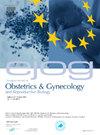妇产科医生对认证维护的看法
IF 2.1
4区 医学
Q2 OBSTETRICS & GYNECOLOGY
European journal of obstetrics, gynecology, and reproductive biology
Pub Date : 2025-04-17
DOI:10.1016/j.ejogrb.2025.113974
引用次数: 0
摘要
目的评价医师对美国妇产科委员会(ABOG)现行认证维持(MOC)活动的看法。研究设计我们采用融合混合方法研究,通过互联网+纸质调查的方式收集平行定量和定性数据,于2024年11月12日至12月13日对全国范围内的妇产科医生进行抽样调查。问卷包括23个项目,内容涉及认证维持、医师职业倦怠和人口统计等各个方面。关于MOC的利弊和改进建议的三个开放式问题也包括在内。结果在收到的5083份请求中,我们收到503份回复(回复率9.9%),其中54份因未通过ABOG参与MOC而被排除。在剩下的449名受访者中,绝大多数医生报告说,MOC相对于他们花费的时间(62.8%)和照顾病人(77.8%)是有价值的。大多数受访者认为MOC有助于他们的专业发展(70.3%),终身学习(64.3%)和患者安全(53.3%)。相反,46%的受访者认为MOC活动是一种负担。超过一半的医生目前经历过职业倦怠(54.1%),其中三分之一的人认为MOC是主要原因。61.8%的受访者支持将重新认证周期延长至2年,46%的受访者支持将重新认证周期延长至3年。最常见的改善MOC的建议是延长重新认证的时间,停止或全面检查实践改进/图表评审活动。大多数妇产科医生认为目前的MOC过程是有价值的,与他们的医学实践相关。然而,大多数受访者也认为这一过程可以改进。本文章由计算机程序翻译,如有差异,请以英文原文为准。
Ob/Gyn physician perspectives on maintenance of certification
Objective
To evaluate physician perspectives on the current maintenance of certification (MOC) activities utilized by the American Board of Obstetrics and Gynecology (ABOG).
Study design
We performed a convergent mixed methods study, using parallel quantitative and qualitative data collected via the internet plus paper surveys of a nationwide sample of Obstetrics and Gynecology physicians from November 12 to December 13, 2024. The questionnaire included 23 items about various aspects of maintenance of certification, physician burnout and demographics. Three open-ended questions regarding the pros and cons of MOC and recommendations for improvement were also included.
Results
Of the 5,083 requests sent, we received 503 responses (response rate 9.9 %), 54 were excluded because they do not participate in MOC through ABOG. Of the 449 remaining respondents, a significant majority of physicians reported that MOC was valuable relative to their time spent (62.8 %) and relevant to caring for their patients (77.8 %). Most respondents felt that MOC aided their professional development (70.3 %), lifelong learning (64.3 %) and patient safety (53.3 %). Conversely, forty-six percent of respondents perceived MOC activities as a burden. Over half of physicians presently experience burnout (54.1 %) and one-third of these felt MOC was a major contributor. Extending the recertification cycle to 2-years was supported by 61.8 % of respondents and to a 3-year cycle by 46 %. The most common suggestions for improving MOC were extending the time for recertification and stopping or overhauling the Practice Improvement/Chart Review activities.
Conclusion
Most Ob/Gyn physicians view the current MOC process as valuable and relevant to their practice of Medicine. However, most respondents also felt the process could be improved.
求助全文
通过发布文献求助,成功后即可免费获取论文全文。
去求助
来源期刊
CiteScore
4.60
自引率
3.80%
发文量
898
审稿时长
8.3 weeks
期刊介绍:
The European Journal of Obstetrics & Gynecology and Reproductive Biology is the leading general clinical journal covering the continent. It publishes peer reviewed original research articles, as well as a wide range of news, book reviews, biographical, historical and educational articles and a lively correspondence section. Fields covered include obstetrics, prenatal diagnosis, maternal-fetal medicine, perinatology, general gynecology, gynecologic oncology, uro-gynecology, reproductive medicine, infertility, reproductive endocrinology, sexual medicine and reproductive ethics. The European Journal of Obstetrics & Gynecology and Reproductive Biology provides a forum for scientific and clinical professional communication in obstetrics and gynecology throughout Europe and the world.

 求助内容:
求助内容: 应助结果提醒方式:
应助结果提醒方式:


